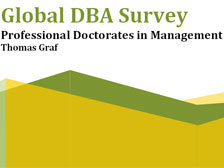Rankings are one means to assess the reputation or quality of academic programs or institutions. Rankings for Masters in Finance or Management, MBA programs and Executive Education, for instance, are published on a yearly basis in internationally recognized newspapers or magazines such as the Financial Times or Businessweek.
DBA Rankings are missing
Interestingly, there are no rankings for professional doctorates in management published from internationally recognized institutions. It is possible, however, to assess the quality of an executive doctorate in management by using other proxies than DBA rankings.
In the absence of a DBA ranking - what can you do to find a quality Doctor of Business Administration?
Here are several suggestions on how the quality of a DBA program can be assessed - even in the absence of internationally recognized DBA rankings.
1. Accreditations
Finding the right doctoral program is not easy. As with other management education related programs such as the Master of Business Administration (MBA) or the Master in Management (MIM) you need to find out how well the program is designed or the content is taught, how much future employers recognize your degree, or how good a school's network is. The good news, however, is: There are agencies that do the job for you - at least partly: accreditation agencies.
Accreditation agencies regularly screen universities or programs by coming on campus and conducting interviews or by requiring reports from the schools and evaluate their quality. In management education, only three accreditation agencies are internationally relevant: AMBA, EQUIS, and AACSB.
- AMBA evaluates and accredits individual programs such as Masters in Business and Management, MBAs, and also Doctor of Business Administration programs. You can have a closer look at those programs that AMBA accredited already. Of course this does not give you a guarantee that the program is the right one of for you - but at least you know that it fulfills internationally accepted standards in management education.
- EQUIS and AACSB accredit the whole institution. If a school has the EQUIS or AACSB accreditation and offers a Doctor in Business Administration program it automatically means that the program is accredited as well. Have a closer look at programs from EQUIS or AACSB accredited institutions. Again this does not give you a guarantee that you find the right program - but you will find programs with guaranteed minimum standards.
2. Assess the research quality of a faculty
Using rankings on the research contribution of faculties can be another means to proxy the quality of DBA programs. Keep in mind that members of a faculty will teach you and that your doctoral advisor will be part of a faculty.
Studying a Doctor of Business Administration means learning how to do research and actually doing research. Most important for this are the people that teach you how to do that: professors. If the faculty is great and has proved its research ability, the likelihood that you profit from that knowledge is high. Hence, a DBA taught by members of a highly capable faculty may be preferable to a DBA taught by less successful professors.
One way to assess a faculty's quality is by counting the number of its publications in top academic journals, for example in the Financial Times Top-45 list. Being able to publish in these journals is extremely difficult and article rejection rates go as high as 95 percent. Having published in these journals therefore increases strongly a professors reputation - and the reputation of his or her faculty. Hence, the more of these top publications a faculty can show the higher its potential research capabilities and the better the learning environment for your DBA studies.
3. General reputation, teaching experience, and exposure to executives
In addition to accreditations or research rankings, you could use the general reputation of DBA institutions as an indicator of quality. For instance, you can check its position in other management education related rankings.
Furthermore, you could try to assess the school's experience in teaching part-time programs or - more specifically - blended programs that combine residential periods with online education. Given that professional doctorates in business administration are taught such that professionals can do the studies besides their jobs, experience in such a sort of teaching may make it more likely that you finish your studies successfully.
Finally, a schools' general exposure to executives may be another indicator of quality. A school, for instance, may have run Executive MBA programs or Executive Education seminars and by this be experienced in managing executives and their specific needs.
By Thomas Graf





